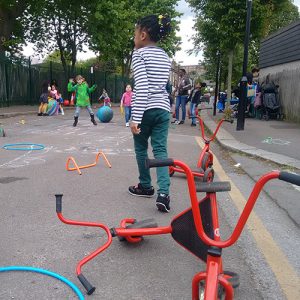Fewer children are playing out on their streets than ever before, new research reveals, as a leading child psychologist warns of the negative impact this could have on child mental health.

Research carried out to mark National Play Day has revealed that just 27 per cent of children regularly play outside their homes, compared to 71 per cent of their grandparents’ generation. For those aged specifically between 55 – 64, it was 80 per cent showing that rates of play have declined steadily in just a few generations.
The research carried out by OnePoll to mark National Play Day (August 3), surveyed 3000 adults and children and also found that as well as traffic, parents and neighbours may be curbing children’s ability to play outside their own homes.
One in four children who took part in the survey said they had been told to stop playing in the street or local area either by their parents or neighbours and 30 per cent said they had been told to stop making noise outside.
Helen Dodd, Professor of Child Psychology at University of Exeter, said:
“To have just 27 per cent of children playing out today compared to 80 per cent in the past represents a huge change to the nature of childhood experiences. It’s logical to expect this to have consequences for young people’s development. As a society we’re perhaps not taking seriously enough.”
She continued: “Some consequences of this reduced level of playing out could be on friendship development, social skills, freedom, independence and negotiation of shared spaces. We are also concerned that these changes to children’s experiences could have an adverse effect on their mental health.
“It was also striking to me that 41 per cent of children had been told to stop playing out by either their parents or other adults such as neighbours. It almost feels like we’re going back to a point where we don’t want to be disturbed by ‘noisy children’”.
Adults who said they regularly played out in their street or area close to their home as a child had better mental health as adults, the survey revealed. Children under 13 who had frequently played out also reported good mental health.
Campaigners and child development experts are now calling for children across the UK to enjoy fun, friends and freedom this summer with the launch of the Summer of Play campaign.
Now in its second year, the group encourages business, councils and charities to pledge their support for more play opportunities for families, particularly for families struggling with the cost of living crisis.
Major companies such as Kingsmill and Amazon are backing the campaign and there are hundreds of activities planned for National Play Day on August 3 and throughout the summer holidays. This year the theme is All To Play For, highlighting that play is for everyone and post-pandemic, play is more important than ever.
Anita Grant, chair of Play England, said:
“The relationship between adventurous play and mental health is stronger for children growing up in lower income families. This suggests that adventurous play might be more beneficial for these children and will increase resilience and improved well being. So it is more important than ever that we keep our focus on play and specifically adventurous outdoor play.
The survey is supported by Play England, Play Scotland, Play Wales, Play Northern Ireland with charity Save The Children. 1000 children and young people aged 6-16 years, 1000 adults aged 18+ and 1000 parents of children aged 6-16 years took part.
The Summer of Play campaign is asking organisations to pledge their support at www.summerofplay.co.uk
